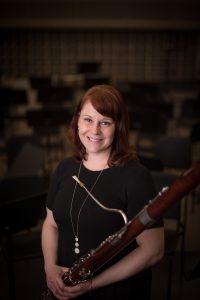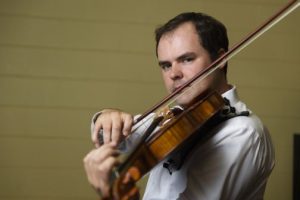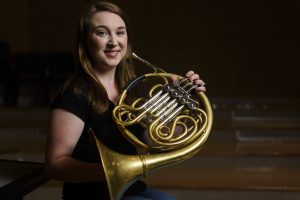
TUSCALOOSA, Ala. — Classical music isn’t dead, nor is it dying, as some say.
But it is changing.
Dr. Jenny Mann, associate professor of bassoon at The University of Alabama and executive director of the Tuscaloosa Symphony Orchestra as well as its principal bassoonist, said in the past 20 years the music genre that most people only associate with Ludwig van Beethoven and Wolfgang Amadeus Mozart has began to blur the lines with other genres.
“I think people have the perception that classical musicians are lofty and stodgy,” she said. “But, in reality, many of us listen to country music, rap and pop music just as much as we listen to classical music.
“We appreciate all kinds of music and really do our best to make our music relate to people just as much as those other kinds of music do.”
Mann said Mozart and Beethoven are what many see as classical music, but over the past 20 years many classical composers have incorporated the language from popular music and jazz into classical pieces, blurring the lines.
The reverse of that – popular music sampling classical – is true as well, she said.
Dr. Jacob Adams, a UA assistant professor of viola and principal violist with the Tuscaloosa Symphony Orchestra, said people have been concerned about the demise of classical music for the past 30 to 40 years.
With classical music performance attendance declining, major symphonic orchestras going on strike and filing for bankruptcy, the reasons people feel the way they feel are understandable, he said.
But the evolution of the genre staunchly refutes the idea that classical is going gently into that good night. Rather, a far cry from it, particularly at UA and in Tuscaloosa where the school is one of 40 in the U.S. to offer an arts management degree, and the city is home to the largest thriving orchestra in West Alabama.

“Just because things don’t look like they used to look, doesn’t mean it’s not vibrant and thriving,” Adams said. “There’s always room for the great symphony voices of the past.
“I think one of the biggest things for me is that we don’t want this music to seem exclusive — like it’s not relevant to people’s lives today. It’s a living, breathing art that we can be active in and engage with. It’s not just meant to be in a museum.”
Mann said UA’s arts management degree has existed for eight years, but the program has really emerged into what it is today in the past three years.
The program teaches people how to run non-profit and for-profit art organizations. Students learn skills such as grant writing, fundraising and how to handle legal issues that commonly arise in the arts and venue management.
A business minor is required to major in the program.
“This is an emerging field,” Mann said. “It’s very new for people to decide to go into this at a young age. Traditionally, people would major in something else and then find their way to this job.
“So there’s a new demand for people wanting these degrees. Our program is unique because students have to actually perform as musicians.”
And students in UA’s classical music programs have the opportunity to perform professionally while still in school by auditioning for the Tuscaloosa Symphony Orchestra.
TSO was founded in 1984 under the name TACO – Tuscaloosa Area Community Orchestra. As the demand for performers grew, it became a professional orchestra.
“I think the Tuscaloosa Symphony Orchestra is a wonderful arts organization that we’re lucky to have here, and it serves as a beautiful bridge between the University world and the cultural activity of the city, especially for someone who recently relocated here,” said Adams, who moved to Tuscaloosa from Santa Barbara, California in 2015.
The orchestra has about 60 members, of which 20 percent are UA faculty, 8 percent UA students and the rest contracted professional performers from across the country. UA faculty members hold all of the principal chairs in the orchestra.

“It is very inspiring to be able to play with musicians that I admire, and playing next to my professors … hearing them do what they’re trying to teach me to play is very humbling,” said Cynthia Simpson, a 26-year-old Prattville native who’s pursuing her master’s in music performance at UA and who has played French horn for TSO for five years.
Though classical music is changing, Mann said there’s still a beauty to the genre that will always make it distinct and worth the ear of anyone who takes the time to sink into its wordless, melodic poetry.
“I love being part of an art form that can be translated to anyone,” she said. “Anyone can identify with this kind of music, especially when there’s no words because they can associate whatever they’re hearing with what they’re thinking.”
TSO’s first performance of the season will be Feb. 6 at 7 p.m. in UA’s Moody Concert Hall. Student tickets cost $10, and adult tickets run between $20 and $40, depending on seat location.
Tickets can be ordered online at tsoonline.org.
Additional performances will be held at 6 p.m. March 10 at the Bama Theater and April 24 at 7 p.m. in the Moody Concert Hall, which will be a joint performance with The University of Alabama Orchestra.
Contact
Jamon Smith, media relations, jamon.smith@ua.edu, 205/348-4956
Source
Dr. Jenny Mann, jmann@tsoonline.org
